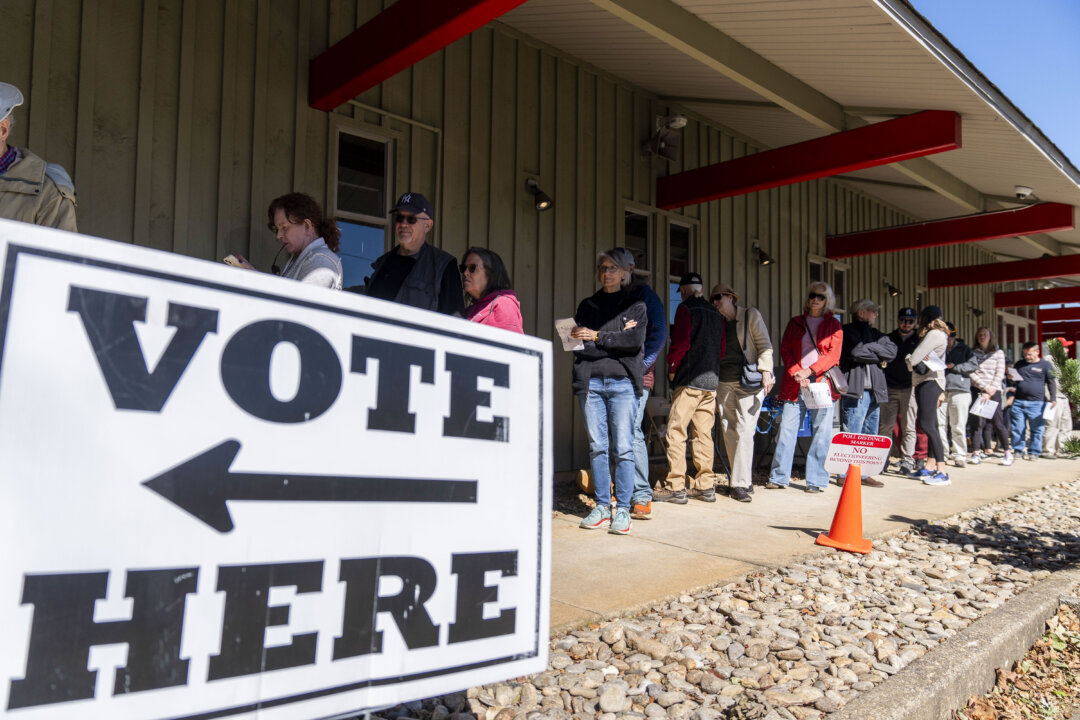Republicans also have early and mail-in voting advantages over Democrats in both Arizona and Nevada.
Republicans have pulled ahead of Democrats in the key swing state of North Carolina as of the morning of Oct. 24, the data show.
Nearly 30 million Americans have cast early ballots across the United States so far, with 12 days to go before the Nov. 5 presidential election, according to the latest compiled election data.
Republicans had been behind Democrats in both in-person early or mail-in ballots in the Tar Heel State. That slight lead held by Democrats appears to have been eroded as GOP voters have now taken a roughly 3,000 early-vote advantage.
About 686,497 Republicans have returned early ballots in the state, compared with Democrats’ 683,072, data provided by the University of Florida’s Election Lab show. Unaffiliated or minor-party voters have returned about 638,090 ballots so far.
Republicans have early and mail-in voting advantages over Democrats in both Arizona, where the party has a 53,000 vote advantage, and Nevada, where Republicans have returned about 12,000 more ballots so far, ahead of the 2024 election, the data show.
In Pennsylvania, which has only reported mail-in ballots as of Oct. 24, Democrats have taken a more than 350,000-vote advantage over Republicans, according to the election website.
Georgia, Michigan, and Wisconsin do not report party affiliation. More than 2.1 million people have voted in Georgia, 1.3 million have voted in Michigan, and more than 716,000 have done so in Wisconsin, which opened early voting earlier in the week and sparked system outages due to high turnout.
More broadly, more Republicans appear to be voting early in this election than in the 2020 election.
Of the more than 28 million votes cast nationwide, 16 million of them are mail-in ballots and nearly 12 million are in-person early votes, data provided by the Election Lab show.
Around half of early votes, or approximately 14 million, were cast in states that report party affiliation. As of Oct. 24, 41.9 percent of early votes have been from Democrats, 35.3 percent were cast by Republicans, and 22.9 percent were cast by voters who are independent or belong to a minor party.
Compared with the 2020 election, Republican voters in 2024 appear to be eating into Democrats’ early-voting lead.
Only 25.2 percent of GOP voters returned mail-in ballots with two weeks to go before the 2020 election, whereas Democrats accounted for 52.2 percent of such votes, 2020 data show. About 21.4 percent of mail-in voters at the time were unaffiliated.
With one week to go before the 2020 election, according to the university-compiled data, Democrats led the way with 52.3 percent, and Republicans saw a decline from the previous week, to 24.5 percent of the total, while unaffiliated voters saw a small increase.
As in 2020, Republicans this year are embracing in-person early voting more than Democrats. About 39.5 percent of those votes have been cast by Republicans, compared with 31.3 percent for Democrats. Four years ago, Republicans and Democrats were neck and neck, at 40.2 percent and 37.5 percent, respectively.Turnout since last week’s start of early voting has been surprisingly strong in North Carolina, coming weeks after Hurricane Helene devastated the western portion of the state, cutting off entire towns and communities.
Voters set a statewide record of more than 350,000 ballots cast on the first day, according to the North Carolina State Board of Elections. By Oct. 24, more than 2 million ballots had been returned.
Karen Brinson Bell, executive director of the state board of elections, has repeatedly praised the efforts of local election workers, some of whom have lost their own homes. She described the damage as unprecedented and the challenges election officials faced in its wake as daunting. Over the first week of early voting, the process has proved to be remarkably smooth, with few complaints expressed publicly.
“Mountain people are strong, and the election people who serve them are resilient and tough, too,” she said last week.
Earlier this week, former President Donald Trump visited areas in North Carolina that were ravaged by Helene, saying that some Americans in the region “felt helpless and abandoned and left behind by their government.”
“In North Carolina’s hour of desperation, the American people answered the call much more so than your federal government,” he said.
Vice President Kamala Harris held a rally in Greenville, North Carolina, in mid-October, telling a crowd that she wants to “fight for the ideals of our country and to fight to realize the promise of America.”
“This is not 2016 or 2020. The stakes are even higher,” she said.
The Associated Press contributed to this report.

